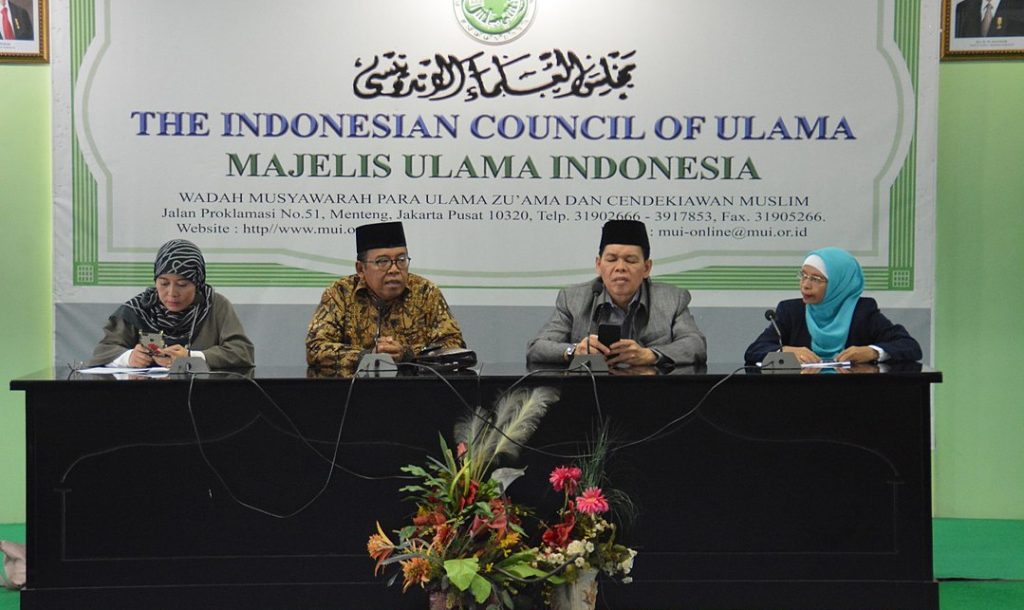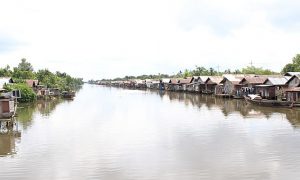In Indonesia Halal certification emerges as a contentious issue time and time again. For example, in March 2021, the Indonesian Council of Ulama (MUI) made a controversial fatwa that ruled the AstraZeneca COVID-19 vaccine as “haram” but permissible for urgency, despite the company’s insistence that it does not contain pork ingredients. On another occasion, Halal certification on unconventional products such as refrigerators and other home electronics has invited public scrutiny.
The issue revolves around the MUI’s effective monopoly on Halal certification in Indonesia. Since the inception of the Halal industry in the late-80s, the MUI has been the sole authority to issue certification for food and cosmetics manufacturers in the Indonesian market. The monopoly has been repeatedly criticised by media and civil society as the cause of corruption.
However, the MUI’s monopoly on Halal certification is collapsing. The second Joko Widodo administration, with the former MUI-chairman Ma’ruf Amin as vice-president, seems eager to tackle the issue with state power. The stance is in line with the administration’s approach to religious affairs, which is characterised by increasing central government oversight. However, it is important to take into account the political context of pluralist-Islamist rivalry. From this perspective, it remains to be seen whether the administration will address the primary concern, which is the accountability of the MUI.
The Halal Product Assurance Law and the accountability of the MUI
The dismantling of the MUI’s monopoly on Halal certification is a result of the inauguration of the Halal Product Assurance Body (BPJPH). The BPJPH is a statutory board under the Ministry of Religious Affairs, tasked to oversee domestic transactions on Halal certification. In October 2019, the Halal Product Assurance Law (UU JPH) No.30/2014 took effect, and the BPJPH has officially commenced operation.
The establishment of the BPJPH is monumental from a financial perspective. While there is no accurate figure available, in Indonesia, a state official stated the government would be able to raise Rp. 22.5 trillion (US$1.6 billion) in revenue once the UU JPH is in full effect. The calculation is, accordingly, based on the number of small and medium-sized enterprises (SME)—almost 60 million, according to the Indonesian Body of Statistics (BPS)—and large companies operating in Indonesia. Halal certification covers not only food and beverages but also drugs, cosmetics, and ingredients for these products, meaning a large number of manufacturers and factories, domestic and foreign, are under the scope of this accreditation.
Behind the legislation has been a concern over the unchecked monopoly enjoyed by the MUI. The UU JPH was introduced during the Yudhoyono presidency, with the intention to bring order to the Halal certification industry. The system is highly unregulated, and the MUI has been prone to corruption with no regulatory measures to hold the council accountable.
The most controversial issue has been the MUI’s financial disclosure. Despite being obliged by government regulation No.14/2008 on information disclosure by the public bodies, the MUI does not report its financial status to the Indonesian public. Multiple observers have speculated that the MUI has generated a significant portion of its income from Halal certification, aside from subsidies from national and regional governments. The MUI has repeatedly argued that they are audited by external bodies such as the National Accreditation Committee (KAN) and no issues have arisen.
The MUI escapes the purview of the Corruption Eradication Commission (KPK), even though the government partially funds the council. This is because it nominally designates itself as a non-governmental organisation aimed to serve the Muslim community through various means, including the Halal certification. Halal certification has been a domain of Islamic clerics (ulama) in the majority of countries, and only a handful of countries such as Malaysia have established a comprehensive state-sanctioned Halal management system.
On top of this is a political sensitivity. Adnan Topan Husod, a coordinator of Indonesia Corruption Watch (ICW), stated to Salaam Gateway that “[there] is no institution or law enforcement that can deal with the MUI. Sometimes when they start to investigate the MUI ulama, [officials] can easily say the government is criminalising them. They can say the government doesn’t support Islam and the ulama, so it becomes politically tricky.” The MUI’s visibility through Halal certification, with their logo attached to every package of food and beverage, certainly lends legitimacy toward the organisation as a champion of Muslim interests in the eyes of the public.
The Indonesian government has attempted to take over the Halal authority multiple times dating back to the Megawati presidency. Observers hope the new system under the UU JPH will finally be able to hold the MUI accountable. However, at the time of the legislation of the UU JPH, the role of the MUI within the new system was not clearly defined. The law introduced a division of labor within the scheme but also assigned the MUI as the final decision maker of all processes of certification.
Specifically, the law formed a new category of an entity, known as the Halal Inspection Agency (LPH). In short, LPH is an agency tasked to audit clients who request certification of their products. Previously, the Institute for the Study of Food, Medicines and Cosmetics (LPPOM MUI), the Halal-certifying subdivision of the MUI, handled all parts of the certification process. In the new system, the BPJPH can assign auditing to qualified third-party organisations. LPPOM MUI will then be confined to the function of final decision-making.
However, the LPPOM MUI was likely confident that the BPJPH will assign them as an LPH, considering their large resources of auditors and expertise on Halal certification. One observer was concerned the bill could elevate the legal status of the MUI’s fatwa to an unprecedented level. Others predicted the MUI would dramatically increase the income from Halal certification in the new system as the new law makes it compulsory for the companies to apply for Halal certification.
History of intimate state-MUI relations
The MUI’s optimism was not wholly unfounded, considering the history of intimate relations between the state and MUI. Founded in 1975, the MUI was formed by the Suharto regime to assist their policy on regulating the Muslim community. Later the Yudhoyono administration reinvigorated the council by providing political and financial patronage to the organisation, expecting to seize the social capital of the burgeoning middle-class conservative Muslim constituency. From there, the MUI managed to redefine itself as an organisation that serves umat (Muslim community) and endeavoured to Islamise the Indonesian society in accordance with the conservative interpretation of the Sunni orthodoxy.
The membership of the MUI executive committee is a testament to this development. The central board of the MUI is an amalgamation of religious intellectuals as well as leaders who represent various Islamic mass organisations (ormas) in Indonesia. As such, there is always an internal contestation between the competing Islamic religious strands within the board. During the Yudhoyono presidency, an increasing number of conservative ulamas joined the executive committee at the expense of pluralist ulamas, establishing the ascendance of conservatism within the council.
This has allowed the MUI to become the chief orchestrator of the “conservative turn” of Islam in Indonesia. Its status as a semi-official clerical body has yielded strong legitimacy to its fatwas, which have aimed at the “purification” of the Indonesian society. Notably, the MUI has had a history of issuing controversial fatwas targeting religious pluralism, liberalism and secularism, as well as the Ahmadiyya community. Many Islamist vigilante organisations took such fatwas into their own hands, resulting in religious violence in some cases.
The Joko Widodo administration attempted to reduce the amount of government support, however, backed by the proponents of pluralist Islam who raised concern over the MUI fatwas. Widodo initially slashed informal financial patronage toward members of the organisation from the Yudhoyono era. Coincidentally, puritanical clerics took over MUI’s national congress in 2015, which determined the management board of the 2015-2020 period. Islamist activists and Salafi Islamic leaders such as Bachtiar Nasir, Zaytun Rasmin, Yusuf Martak and late Tengku Zulkarnain were elected as executives, further propelling the conservative turn of the MUI. In the wake of the national congress, the MUI played a critical role during the infamous Aksi Bela Islam rally which targeted Basuki “Ahok” Tjahaja Purnama, which resulted in then-Jakarta governor being convicted and jailed for blasphemy.
Backlash against the MUI and increasing central government oversight
It seems the role of the MUI within the conservative turn of Indonesian Islam has invited backlash from the Widodo administration in the form of an increasing government oversight over the council. The development of the issue of Halal certification supports this theory.
The administration initiated a “preemptive strike” during the selection of the BPJPH head in August 2017. Lukmanul Hakim, the director of LPPOM MUI and one of the leading candidates of the chair, was removed from the shortlist by the Ministry of Religious Affairs three days before the official announcement. Instead the Ministry appointed Sukoso, a university professor with a modest background as the director of the BPJPH.
From there, a cold war between LPPOM MUI and the BPJPH intensified. In August 2019, headed by Ikhsan Abdullah, the director of the MUI’s Law Commission and an attorney representing Lukmanul Hakim, LPPOM MUI’s 31 regional branches filed a lawsuit with the Constitutional Court to assert their legal credentials and demanded the revocation of several articles of the UU JPH, to prevent the complete transfer of the mandate. Among the reasons for the lawsuit, LPPOM MUI emphasised Halal as the realm of Islamic jurisprudence (fiqh) and reasserted the “normativity” of the ulama handling Halal certification instead of the government. The court immediately dismissed the lawsuit and LPPOM MUI was barred from reapplying for the revision of the contested articles.
The conflict reached its peak in 2020 with the introduction of the Job Creation Law (UU Cipta Kerja) or the Omnibus Law. The dispute revolved around the previously mentioned LPH. The BPJPH urged the parliamentary committee on the bill to put Halal certification into consideration and revise the UU JPH. The BPJPH complained there are not enough auditors to sustain its operation, as LPPOM MUI monopolised Halal auditors. The MUI has been the only body in Indonesia that can train and certify Halal auditors.
Reflecting on this issue, the parliamentary committee on the bill decided to open the gate for other entities, such as the universities and Islamic ormas (e.g. Nahdlatul Ulama), to establish their own LPH, and to revoke the requirement of Halal auditors to obtain certifications from the MUI. As a result, LPH will be able to form partnerships with the BPJPH to process audits without the involvement of the MUI. The decision infuriated the MUI.
In the end, the recent Omnibus Law included a significant revision of the UU JPH, mainly concerning fees, duration of certification and the regulations surrounding LPH. Based on the Omnibus Law, in February 2021 the parliament passed the Halal Product Assurance Law (UU JPH) No.39/2021, which stipulated that LPH can be formed not only by universities and Islamic ormas but also by the state-owned enterprises and government at all levels. Under this regulation, not only did the MUI lose authority over Halal auditors but the state also increased its prerogative to influence the outcome of the Halal certification process.
Concurrently, the MUI was reorganised. After the 2020 national congress held in November to decide the MUI executive committee of the 2020-2025 period, the MUI removed Islamist leaders from the central board and replaced them with pluralist ulamas mainly hailing from Nahdlatul Ulama and Muhammadiyah. The MUI’s new executive committees will likely follow the direction of the government and smooth relations with the BPJPH.
With the reorganization of the MUI executives, the conflict between LPPOM MUI and the BPJPH effectively made a “soft landing.” In March 2021, the secretary-general of the MUI Amirsyah Tambunan and the new head of BPJPH Mastuki agreed the two organisations will foster cooperation to accelerate Halal certification for the benefit of the economy. The “soft landing” has likely urged LPPOM MUI to accept its position within the new Halal certification regime and respond to the long-standing accusation of corruption. In April, the institution announced it has been implementing an anti-bribery management system in a bid to improve governance standards.
However, the critical issue regarding the accountability of the MUI remains unaddressed. The politics of Halal certification can be interpreted as a win for Widodo, pluralist ulamas and business interests, and a defeat for Islamist agenda. But the ambiguous legal basis and unregulated system that created the MUI’s lack of transparency remains. LPPOM MUI still maintains its position on the question of financial disclosure and denies its responsibility to report to the public. This demonstrates that increasing central government oversight over religious affairs is an issue of power struggles, rather than democratic integrity.
 Facebook
Facebook  Twitter
Twitter  Soundcloud
Soundcloud  Youtube
Youtube  Rss
Rss 



